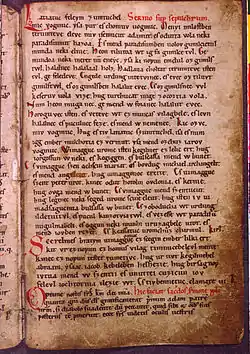Funeral Sermon and Prayer
The Funeral Sermon and Prayer (Hungarian: Halotti beszéd és könyörgés) is the oldest known and surviving contiguous Hungarian text, written by one scribal hand in the Latin script and dating to 1192–1195. It is found on f.154a of the Codex Pray.

Importance
The importance of the Funeral Sermon resides from being the oldest surviving Hungarian and as such also the oldest Uralic, text — although individual words and even short partial sentences appear in charters, such as the founding charter of the Veszprém valley nunnery (997–1018/1109) or the founding charter of the abbey of Tihany (1055).
Structure
The whole monument has two parts: the sermon's text (26 lines and 227 words) and the prayer (6 lines and 47 words). Not counting repeated words, there are 190 individual terms in the text. The work was written after a Latin version, which has been identified and can be found in the very codex. However, the Funeral Sermon and Prayer is a new composition based on it, rather than a mere translation. Since 1813, the manuscript has been kept in Budapest, Hungary, and is currently in the National Széchényi Library.
Text
Note on transcription
The text in the original manuscript is written in Carolingian minuscule. This script uses ſ as the sole form for s, even at the end of words. Likewise, for z the historical ʒ form is used by the scribe. In this transcription we follow Hungarian editing tradition, where the ſ is retained, but ʒ is replaced by its modern equivalent.
Diacritics on vowels and y (dots, acutes) have been omitted.
The funeral sermon
Sermo ſup ſepulchrum. Latiatuc feleym zumtuchel
mic vogmuc. yſa pur eſ chomuv uogmuc. Menyi miloſtben
terumteve eleve miv iſemucut adamut. eſ odutta vola neki
paradiſumut hazoa. Eſ mend paradiſumben uolov gimilcictul
munda neki elnie. Heon tilutoa wt ig fa gimilce tvl. Ge
mundoa neki meret nu[m] eneyc. yſa ki nopun emdul oz gimilſ
twl. halalnec halalaal holz. Hadlaua choltat terumteve iſten
tul. ge feledeve. Engede urdung intetvinec. eſ evec oz tiluvt
gimilſtwl. es oz gimilſben halalut evec. Eſ oz gimilſnek vvl
keſeruv uola vize. hug turchucat mige zocoztia vola.
Num heon muga nec. ge mend w foianec halalut evec.
Horogu vec iſten. eſ veteve wt ez muncaſ vilagbele. eſ levn
halalnec eſ poculnec feze. eſ mend w nemenec. Kic ozvc.
miv vogmuc. Hog eſ tiv latiatuv ſzumtuchel. iſa eſ num
igg ember mulchotia ez vermut. yſa mend ozchuz iarov
vogmuc. Wimagguc uromv iſten kegilmet ez lelic ert. hug
iorgoſſun w neki. eſ kegiggen, eſ bulſassa mend w bunet.
Eſ vimagguc ſzen achſcin mariat. eſ bovdug michael archangelt.
eſ mend angelcut. hug uimaggonoc erette. Eſ uimagguc
ſzent peter urot. kinec odut hotolm ovdonia. eſ ketnie.
hug ovga mend w bunet. Eſ vimagguc mend ſzentucut.
hug legenec neki ſeged uromc ſcine eleut. hug iſten iv ui-
madſagucmia bulſaſſa w bunet. Eſ zoboducha wt urdung
ildetuitvl. eſ pucul kinzotviatwl. eſ vezeſſe wt paradiſu[m]
nugulmabeli. eſ oggun neki munhi uruzagbele utot. eſ
mend iovben rezet. Eſ keaſſatuc uromchuz charmul. Kir[ie e]l[eison].
The prayer
Scerelmes bratym uimagg(om)uc ez ſcegin ember lilki ert.
kit vr ez nopun ez homuſ világ timnucebelevl mente.
kinec ez nopun teſtet tumetivc. hug ur uvt kegilmehel
abraam. yſaac. iacob. kebeleben belhezie: hug birſagnop
ivtva mend vv ſcentii ef unuttei cuzicun iov
felevl iochtotnia ilezie vvt. Eſ tivbennetuc. clamate iii. k[yrie eleison].
Sources
- Gábor: Régi magyar nyelvemlékek (I.). Buda, 1838
- Zolnai, Gyula: Nyelvemlékeink a könyvnyomtatás koráig. Budapest 1984
- Benkõ, Loránd: Az Árpád-kor magyar nyelvű szövegemlékei. Budapest, 1980.
External links
- English translation by Alan Jenkins (Babel Web Anthology; original source: Hundred Hungarian Poems, Albion Editions, Manchester, 1976.)
- Another English translation of the Funeral Sermon and Prayer
- A high-quality photographic reproduction at the Hungarian National Széchényi Library
- Old Hungarian Corpus – searchable text of the Funeral Sermon and Prayer in its original orthographic form as well as its version normalized to Modern Hungarian spelling